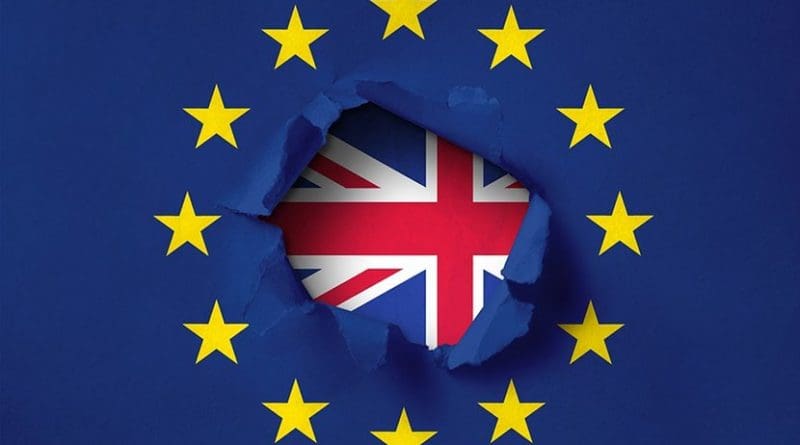Brexit Clock Ticks On As UK-EU Negotiations Deadlocked – OpEd
By Arab News
By Cornelia Meyer*
There are fewer than 50 days to go until the UK leaves the EU, and we are no nearer a deal than we were the day after the referendum on June 24, 2016. Alas, the country seems more divided than ever.
Two weeks ago, Parliament voted for the Brady amendment, which instructed the government to renegotiate the so-called Northern Irish “backstop” and replace it with “alternative arrangements to avoid a hard border.”
Much of the anguish — but by far not all of it — stems from the post-Brexit relationship between the North and the Republic of Ireland. Some 20-odd years ago, the Good Friday Agreement brought peace to Northern Ireland after decades of armed sectarian conflict. Opening the border between the North and the Republic was part and parcel of that peace agreement. The backstop legislates that, in case the EU and UK fail to sign a trade agreement, Northern Ireland would remain in the customs union, while Great Britain had a lesser arrangement with the EU. This has never been acceptable to the Democratic Unionist Party, whose 10 Members of Parliament importantly prop up Prime Minister Theresa May’s minority government.
The reaction from Brussels was a clear “no, nein, non, nie.” The withdrawal agreement was not up for renegotiation.
Last week, May dispatched herself to Belfast to find out just how much of an issue the open borders on the island are. On the same day, Irish Taoiseach Leo Varadkar visited the presidents of the EU Commission and EU Council, Jean-Claude Juncker and Donald Tusk respectively, as well as the EU parliament. Tusk stirred up a hornets’ nest when he remarked: “I’ve been wondering what that special place in hell looks like, for those who promoted Brexit without even a sketch of a plan how to carry it out safely.” It reflected the EU’s frustration at the negotiations and at the apparent unwillingness of Her Majesty’s Government to listen to the clearly delineated EU position.
On the other side of the English Channel, Tusk’s comments unleashed a real firestorm and did the EU position little favor. It supported the Brexiteers’ argument that the Eurocrats in Brussels were arrogant, aloof and out of touch.
When May visited Brussels the next day, her demands met with resistance. Worse, opposition leader Jeremy Corbyn had written a letter to the prime minister advocating that Labour might support her Brexit deal if the UK stayed in the customs union. This, however, is a clear no-go zone for the Tory party’s Brexiteers. The timing of Corbyn’s letter was a masterclass in how to undermine the government’s negotiating position. Juncker said that the EU was open to the UK remaining in the customs union and that he was willing to discuss the political declaration — a loosely worded document that puts down the guidelines for the negotiation of the future relationship between the UK and the EU. However, he and Tusk stood firm on blocking a renegotiation of the withdrawal agreement.
Last Friday, May had dinner with Varadkar in Dublin. While it is always good to keep the lines of communication open, there is very little that Varadkar can do. Ireland is part of the EU and, as such, is not authorized to negotiate with the UK on a bilateral basis.
Meanwhile, “back at the ranch,” politicians have been acting up. Corbyn’s refusal to support a second referendum risks splitting the Labour Party. In the Conservative Party, meanwhile, hardline Brexiteers and supporters of a second referendum are at each other’s throats — so much so that there is a real danger that the Tories might split too. The “original Brexiteer,” Nigel Farage, has backed a new Brexit-supporting party to put himself in pole position in case the UK’s departure is delayed. There is much angst among the general population. Some Brexiteers feel so ostracized that they have formed a nationwide “Leavers of Britain” support group (Remainers do not feel much differently either).
The Bank of England cited uncertainty surrounding Brexit as one of the reasons it shaved half a percentage point off its economic growth forecast for 2019. Worse, the Bank warned of a possible recession. The press has also run story after story of just how unprepared the country is for leaving the EU without a deal. As if all of this was not enough, Liam Fox’s Department for International Trade had to admit that, after the UK leaves the EU, Japan would not be willing to trade with it along the lines of the current agreement Tokyo has with Europe. Japan would be looking for better terms. The same holds true for many other jurisdictions, such as Canada or Mexico. So much for the claim that leaving the EU would enable the UK to become a truly global trading nation — a key argument of the Brexiteers.
While all of this is going on, we can hear the tick-tock of the Brexit clock: As of Sunday, 47 days and counting. There seems to be no parliamentary majority for the prime minister’s Brexit package, whatever it may be, and the talks with Brussels are deadlocked. The government is now floating the idea of resuming talks with the EU on the margins of the EU-Arab League summit in Cairo on February 24 -25 and postponing the vote in Parliament until after that. This has a whiff of brinkmanship, for the closer we push final negotiations and parliamentary voting procedures to the deadline, the likelier the UK is to leave without an agreement.
• Cornelia Meyer is a business consultant, macro-economist and energy expert. Twitter: @MeyerResources

